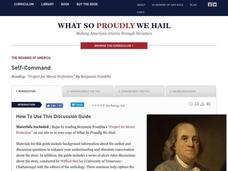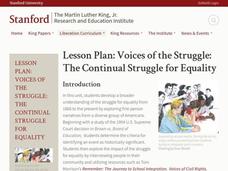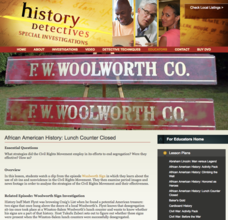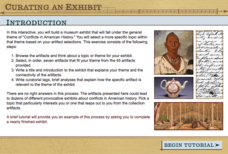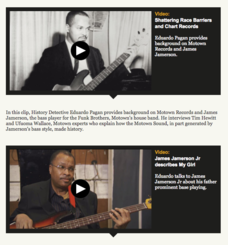American Evolution
Virginia Runaway Slave Ads
What does an ad reveal about a culture, or about the values of its intended audience? Class members examine a series of runaway slave ads—one of which was written by Thomas Jefferson—and consider what these primary source documents...
What So Proudly We Hail
The Meaning of America: Self-Command
Even for one of the most accomplished men in American history, there was room for improvement. Challenge high schoolers to use Benjamin Franklin's Project for Moral Perfection to analyze text, make inferences, connect to historical...
Candace Fleming
Ben Franklin’s Almanac: Being a True Account of the Good Gentleman’s Life
Candace Fleming's award winning Ben Franklin's Almanac is the anchor text for a classroom guide that provides teachers with a cache of pre, during, and post-reading activities.
Stanford University
Letter from Birmingham Jail: The Power of Nonviolent Direct Action
What strategies are most effective in changing an unjust law? Class members examine the tactics used in the Birmingham Campaign of 1963 (Project C) to achieve social justice and social transformation. After examining documents that...
Stanford University
Beyond Vietnam
On April 4, 1967 Martin Luther King, Jr. delivered his speech "Beyond Vietnam." The controversy that followed is the focus of a three-instructional activity unit that asks class members to consider the political and social implications...
Stanford University
Martin Luther King, Jr. and Malcolm X: A Common Solution?
Much has been made of the differences between Martin Luther King, Jr. and Malcolm X. But was there any common ground between them? Class members reconsider what they think they know about these two civil rights leaders with...
Stanford University
Voices of the Struggle: The Continual Struggle for Equality
As part of a study of the Civil Rights Movement from 1868 to the present, class members examine first person narratives, the Supreme Court case Brown v. Board of Education, and other significant events in civil rights history....
PBS
African American History: Lunch Counter Closed
Young historians investigate and evaluate the effectiveness of the strategies the Civil Rights Movement used to end segregation in the United States. After watching an video interview with Carl Matthews and Bill Stevens who participated...
PBS
African American History: Climbing the Wall
Imagine the challenge of trying to trace your family genealogy if no records were kept of births and deaths. Where would you look for information? What types of documents could provide you with the information you seek? History...
Library of Virginia
An Overview of American Slavery
The final lesson in a unit study of American slavery asks young historians to synthesize what they have learned about how slavery in America changed over time. Revisiting the many documents they have examined, they consider the economic,...
Library of Virginia
Emancipation and the Thirteenth Amendment
Why didn't the Emancipation Proclamation free all slaves? Young historians study primary source documents including Lincoln's proclamation and the 13th Amendment to the United States Constitution. Groups also investigate the three...
Library of Virginia
Life as a Liberated People
Imagine having no control over your life and then suddenly having to provide for yourself. Such was the challenge faced by many American slaves after emancipation. Class members are asked to consider these challenges are they examine...
Library of Virginia
Life as an Enslaved People
As part of a study of slavery in the United States, class members analyze documents related to the sale of slaves. They consider not only the text of the bills of sale but also what the appearance of the broadsides suggest.
Library of Virginia
Death or Liberty
What would you do to protect your own freedom? How far would you go to protest injustice? Class members are asked to consider these questions as they read primary source documents that detail events in the lives of Gabriel, Nat Turner,...
Library of Virginia
Antebellum Freedom
From indentured servitude to involuntary race-based servitude, slavery has taken many forms in American history. Class members examine three manumission petitions that reveal how the rights of African Americans and African American...
Annenberg Foundation
Curating an Exhibit
A curated exhibit at a museum has a point of view. Artifacts are selected and arranged to cause viewers to contemplate this point of view or theme. An interactive provides class members with an opportunity to create an exhibit, to curate...
University of Wisconsin
Analyzing Presidential Campaign Propaganda
Campaign propaganda has evolved from 1952 through the presidential election of 2008. A social studies activity prompts class members to analyze the devices used in ads and political cartoons, noting strategies they believe would work to...
DocsTeach
How Effective were the Efforts of the Freedmen’s Bureau?
Effective or ineffective? As part of a study of post Civil War America, young historians analyze a series of primary sources to evaluate the effectiveness of the Freedmen's Bureau in addressing the challenges faced by the slaves freed by...
US DBQs Reconstruction to Today
This activity contains DBQs about United States History ranging from Reconstruction to Present Day. All of the documents provided contain primary sources for students to answer as well as an essay to complete once documents are complete.
US DBQs European Migration through Civil War
This activity contains DBQs about United States History ranging from the European Migration through the Civil War. All of the documents provided contain primary sources for students to answer as well as an essay to complete once...
American Battle Monuments Commission
The Great War: U.S. Division Under Allied Command
The victory of Allied forces in World War I is due in large part to the continued collaboration and support of the Allied divisions themselves. Learn more about the ways Australia, Britain, France, and the United States worked together...
US National Library of Medicine
Drug Use and Abuse: Past and Present
Pick your poison: tobacco, alcohol, opiates, cocaine, or marijuana. An online exhibition launches a research project that asks groups to select one of the five drugs and gather information on how the use of the drug and the regulations...
PBS
The Sixties: Hitsville USA
James Jamerson. You probably heard him but may not have heard of him. But fans of Motown Records will certainly recognize his contributions to the sound that desegregated popular music during the 1960s. Challenge young history...
PBS
The Sixties: Dylan Plugs in and Sells Out
Before Woodstock, there was Newport. Get plugged in to the social changes of the 1960s with a activity that looks at Bob Dylan's performance at the 1965 Newport Folk Festival as a symbol of the radical changes that marked the era.



